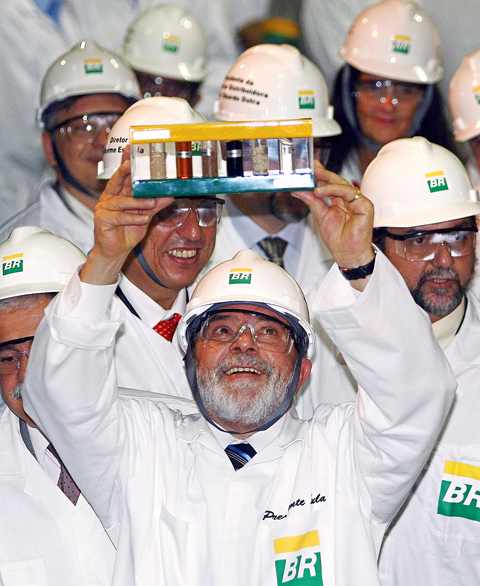Brazilian President Luiz Inacio Lula da Silva said on Sunday he would seek to convince world leaders gathering in Rome this week that ethanol is not to blame for global food inflation threatening millions with hunger.
Brazil is the world’s largest ethanol exporter and a pioneer in sugar-cane based biofuels, making it a target of critics who say ethanol is behind increases in world commodity prices.
Lula said the UN summit on food security which begins today would give Latin America’s biggest economy an opportunity to shape the debate about biofuels — and hopefully win over some skeptics.

PHOTO: AFP
“This gathering that the [UN Food and Agriculture Organization] is promoting will be a great opportunity for Brazil,” Lula told reporters in Rome ahead of the event.
“I’m convinced that we’re at the beginning a debate … It’s up to Brazil, a center of excellence in ethanol production, to prove that it’s fully possible to make ethanol output compatible with the production of food,” he said.
UN Secretary-General Ban Ki-moon, who has set up his own task force to find answers to the food security crisis, was expected to hold private talks with Lula in Rome yesterday.
The leaders of France, Spain, Japan, Argentina and some African nations are attending.
Iranian President Mahmoud Ahmadinejad is also expected.
Most of the anti-biofuel ire has been aimed at US production of maize-based ethanol which has diverted large quantities of that staple into fuel.
Critics say in Brazil, the production of ethanol is pushing cattle ranchers and farmers deeper into the Amazon rainforest.
Lula rejected such claims and said countries in Europe and elsewhere had no right to make policy suggestions on the Amazon.
Lula said Brazil was proof that countries did not need to choose between food and fuel, because Brazil, which produces more biofuel also produces more food.
The WWF estimates that demand for ethanol will reach 100 billion liters by 2012, and that the US, the biggest producer, will provide 42 percent of that.
Gasoline consumption, by way of comparison, was 1.24 trillion liters in 2005.
Currently, the US produces 28 billion liters of ethanol, followed by Brazil with 22 billion liters.
The WWF did note, however, that sugarcane fields tended to occupy areas once given over to cattle-raising, and even though it rated that factor as insignificant, it did warn that some ancillary effect of displaced ranchers moving into the Amazon, contributing to deforestation, could occur.
Eduardo Leao, the executive director of the Unica federation covering the sugarcane industry, said ethanol production uses just 1 percent of Brazil’s total arable land.

The CIA has a message for Chinese government officials worried about their place in Chinese President Xi Jinping’s (習近平) government: Come work with us. The agency released two Mandarin-language videos on social media on Thursday inviting disgruntled officials to contact the CIA. The recruitment videos posted on YouTube and X racked up more than 5 million views combined in their first day. The outreach comes as CIA Director John Ratcliffe has vowed to boost the agency’s use of intelligence from human sources and its focus on China, which has recently targeted US officials with its own espionage operations. The videos are “aimed at

STEADFAST FRIEND: The bills encourage increased Taiwan-US engagement and address China’s distortion of UN Resolution 2758 to isolate Taiwan internationally The Presidential Office yesterday thanked the US House of Representatives for unanimously passing two Taiwan-related bills highlighting its solid support for Taiwan’s democracy and global participation, and for deepening bilateral relations. One of the bills, the Taiwan Assurance Implementation Act, requires the US Department of State to periodically review its guidelines for engagement with Taiwan, and report to the US Congress on the guidelines and plans to lift self-imposed limitations on US-Taiwan engagement. The other bill is the Taiwan International Solidarity Act, which clarifies that UN Resolution 2758 does not address the issue of the representation of Taiwan or its people in

US Indo-Pacific Commander Admiral Samuel Paparo on Friday expressed concern over the rate at which China is diversifying its military exercises, the Financial Times (FT) reported on Saturday. “The rates of change on the depth and breadth of their exercises is the one non-linear effect that I’ve seen in the last year that wakes me up at night or keeps me up at night,” Paparo was quoted by FT as saying while attending the annual Sedona Forum at the McCain Institute in Arizona. Paparo also expressed concern over the speed with which China was expanding its military. While the US

SHIFT: Taiwan’s better-than-expected first-quarter GDP and signs of weakness in the US have driven global capital back to emerging markets, the central bank head said The central bank yesterday blamed market speculation for the steep rise in the local currency, and urged exporters and financial institutions to stay calm and stop panic sell-offs to avoid hurting their own profitability. The nation’s top monetary policymaker said that it would step in, if necessary, to maintain order and stability in the foreign exchange market. The remarks came as the NT dollar yesterday closed up NT$0.919 to NT$30.145 against the US dollar in Taipei trading, after rising as high as NT$29.59 in intraday trading. The local currency has surged 5.85 percent against the greenback over the past two sessions, central